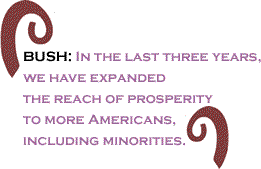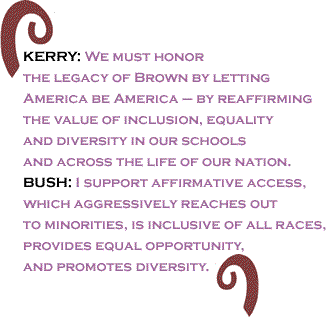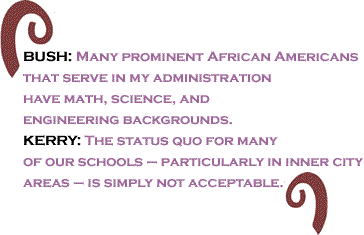
|
|||||||||||||||||||||
 |
|||||||||||||||||||||
|
The following appeared as a Special Feature of THE BLACK COLLEGIAN and IMDiversity.com. On November 2, 2004 we elect a new President. Our government is stable, but it can change in ways that reflect the perceptions of those governed, especially its minorities. As underrepresented minorities in the workplace and, unfortunately, at the ballot box, African Americans, Asian Americans, Hispanic Americans, Native Americans and women must vote wisely to protect their interests. By appointments to the Federal courts, especially to the Supreme Court, Presidents influence our lives long after their terms expire. Very likely, the next President will have to replace two Justices of the Supreme Court. With the influence that the President has over the lives of Black collegians particularly in mind, we asked both candidates for their positions on issues that specifically, but not exclusively, affect the readers of THE BLACK COLLEGIAN Magazine. You should read their responses with care and, we hope, interest. We encourage you to download or print out this feature and share it with friends and loved ones.
THE BLACK COLLEGIAN (TBC): What specific reason or reasons would you give African-American collegians for voting for you? President George Bush: First,
I offer a clear and positive plan for winning the war on terror,
protecting our homeland, and
further strengthening our economy and that is good for all Americans.
Also, I have worked hard to make the American Dream something we
can all realize. African-American leaders such as Sojourner Truth,
Harriet Tubman, Frederick Douglass, Booker T. Washington, Martin
Luther King Jr., and Leon Sullivan challenged America to respect
the dignity and equality of all people, regardless of race. In
the last three years, we have expanded the reach of prosperity
to more Americans, including minorities. Under my Administration
minority homeownership is at an all-time high; more than 15 percent
of small business owners and entrepreneurs are minorities; we are
making more small business loans to
Senator John Kerry: I will make our nation stronger by standing up for our shared values of opportunity, responsibility, and fairness; by growing the middle class; strengthening our families; and expanding opportunity for all Americans. I will appoint judges that enforce our civil rights laws and will protect the public interest value of diversity, reducing racial disparities in education, employment, income, wealth, health, home ownership and business ownership. I have a vision for American education: Every child should be held to high standards, and every school should have the resources and the responsibility to meet those standards. Every classroom should have a great teacher. Every young person should graduate from high school. Every young person who works hard and wants to go to college should be able to afford it and should be able to get the skills they need to succeed throughout their lives. If elected, I will offer a fully refundable College Opportunity Tax credit on up to $4,000 of tuition for every year of college and offer aid to states that keep tuitions down. I will launch a new effort to ensure that all of our workers can get the technical skills and advanced training they need. One million students are dropping out of high school every year, and because the price of college has risen by 35 percent over the last three years, 220,000 qualified young people were priced out of college last year. I have a plan to do better to ensure that all Americans can make the most of their God-given talents. As I said in my address to the NAACP, I will be a President who talks with everyone – those who agree with me and those who don’t. I will be a President who truly is a uniter, not one who seeks to divide our nation by race, riches or any other label. I will be a President who shares the values of all Americans who get up and go to work every day, who try to raise their families in dignity, and who want to leave this world a better place for their children.
TBC: The Higher Education Act of 1965, as amended, defines a Historically Black College or University as “any historically Black college or university that was established prior to 1964 whose principle mission was, and is, the education of Black Americans. …” In light of the movement in the country, from Affirmative Action to diversity, can HBCUs expect continued financial support from your presidency? Would your administration increase that financial support? Kerry: This year the United States is celebrating the 50th Anniversary of a pivotal court decision in American history. Brown vs. Board of Education began the process of tearing down the walls of inequality in our society. We must honor the legacy of Brown by letting America be America – by reaffirming the value of inclusion, equality and diversity in our schools and across the life of our nation. HBCUs prepare African-American students to succeed in today’s economy and are essential to America’s educational system. If elected President, I will continue to support these institutions financially. Bush: Historically Black Colleges and Universities play an essential role in helping African Americans achieve the American dream, and I strongly support their work. My Administration has increased funding for minority-serving institutions by 30 percent over four years. Funding has increased for Historically Black Colleges and Universities, Historically Black Graduate Institutions, and Hispanic-serving Institutions from $298.5 million in FY 2001 to a requested $395 million in my FY 2005 budget. TBC: As more White students attend HBCUs, at least one HBCU now has a White majority, and many have programs that have White majorities. Should HBCUs limit the enrollment of non-African Americans as a means of maintaining their role as institutions whose mission is the education of Black Americans? Should an HBCU that loses its Black majority lose its Federal financial support as an HBCU? Bush: These universities continue to have a principal mission, the education of Black Americans. Only if a school is classified legally as an HBCU will it receive financial support as an HBCU. Kerry: America’s 105 Historically Black Colleges and Universities
have a rich heritage and have played a prominent TBC: The Supreme Court in the University of Michigan Affirmative Action case upheld race-based preference as a means of creating diversity in colleges and universities, even though it indicated its “uneasiness” with such preferences. Do you support race-based preferences as a means of increasing the number of Blacks attending non-HBCUs if other methods fail to increase that number? Kerry: I am now, and have always been, strongly in favor Affirmative Action. America’s diversity is a strength, not a weakness, and it’s not just universities that have come to realize that – businesses know it too. That’s why many of the nations’ most successful businesses stood against Bush’s efforts to undermine the University of Michigan’s Affirmative Action program. Justice O’Connor recently wrote in the Michigan case that she expects that Affirmative Action will be unnecessary in 25 years. It would be nice to make enough progress in the next 25 years to make Affirmative Action unnecessary – but at the rate we are going right now it won’t happen. I want to focus the nation on an all out effort to reduce racial disparities in education, employment, income, wealth, health, home ownership and business ownership. I am committed to both doing what we know needs to be done now – and to leading the effort to find new solutions. Bush: I strongly support
diversity, including racial diversity in higher education. I
am pleased
the Court made clear that colleges
and universities must engage in a serious, good faith consideration
of workable, race neutral alternatives to promote diversity. Although
much progress has been made,
TBC: Because far more Black females are attending colleges and universities, many – perhaps most – HBCUs have Black female majorities. Would you support Black gender-based preference at HBCUs as a means of increasing the number of Black males attending these institutions? At non-HBCUs? Bush: As stated above, I do not support unconstitutional preferences because they can perpetuate stereotypes and cause further divisions in society. Schools should seek diversity by considering a broad range of factors in admissions, including a student’s potential and life experiences. Kerry: In New York City, 50 percent of Black males are unemployed. In order to successfully implement a program geared towards producing an educated and motivated American people, funding for educational opportunities has to start at an early age. We haven’t met the promise of the Brown vs. Board of Education decision when too few African Americans are finishing high school, and only 18 percent are graduating college. Our children will never have equal opportunity unless, once and for all, we close the ever-widening achievement gap. We know the answer is both higher expectations and greater resources. You cannot promise no child left behind and then pursue policies that leave millions of children behind. America can do better. And we will by lifting more of our people out of poverty, expanding the middle class, providing health care, and bringing jobs, hope and opportunity to all the neighborhoods of the forgotten America. America must reaffirm the value of inclusion, equality, and diversity in our schools and across the nation by opening doors of opportunity, so that more of our young people will pursue a higher education. TBC: Harvard University reports that 8% of its students are African Americans. Of this 8%, only 3% are Americans, descendants of American slaves. For reporting a university’s diversity, is it proper to report international Blacks and American descendants of slaves as a single unit or a single category called "African American"? Kerry: Where a university reports the representation of African Americans, the reporting should be accurate. Bush: Every college and university should want to report the racial demographic makeup of their institution and should make serious efforts to reach out to minorities of both American and international descent. Just as it is in the interest of colleges and universities to reach out to minorities, it is also in the interest of colleges and universities to reach out to both American descendents of slavery and international students to ensure a diverse student population. TBC: If you could do so without being heavy handed or intrusive, would you be willing to ask institutions of higher learning to focus as much on increasing their exposure of all students to minority cultures through their curriculum offerings as on increasing the number of minority students? Would NEH be a legitimate tool for encouraging the development of college courses on minority cultures under your administration? Bush: The Federal Government does not determine the curriculums of colleges and universities. However, we are providing flexible funding for our Nation’s colleges and universities to help them develop the best curriculum possible for their students. Kerry: America’s diversity enriches our communities and our country. I support strong efforts at colleges to educate our students about America’s many communities and at the same time to foster the core values that bring us together as Americans.
TBC: According to a report of the National Science Foundation, African Americans, Native Americans, and Hispanic Americans make up only 5% of graduate engineering/science students. As President would you do anything specifically designed to increase minority participation in graduate engineering/science programs? Would your administration encourage NSF to develop means of increasing the number of minority graduate engineers and scientists? Kerry: America will only prosper in the global economy if we give every child a world-class education. Our current efforts to educate and prepare Americans to thrive in an increasingly technological society are totally inadequate. This is particularly true among our nation’s minorities. I have a plan to invest in K-12 math and science education, reward colleges for increasing the number of science and engineering degrees, and create state-of-the-art online learning technologies that allow hardworking American workers to get high-quality training and education at a time, place, and pace that works for them. Bush: The under-representation of minorities in science and technological fields deprives us of the contributions of many talented Americans and diminishes our Nation’s competitiveness. Many prominent African Americans that serve in my administration have math, science, and engineering backgrounds. An example is Deputy Administrator of NASA Fred Gregory, a former Air Force combat pilot in Vietnam and an accomplished astronaut. Minority institutions provide an important educational opportunity for minority students, particularly in science and engineering. My Administration has worked diligently to uphold the 1998 amendments to the Higher Education Act of 1965, Section 307, offering aid to minority institutions to address the under-representation of minorities in science and technological fields. I have also supported enhancing opportunities for young people to study math and science in high school. TBC: Black college graduates still earn less than the average earned by college-educated White men doing the same professional work. As President would you have any influence over disparities in income for people doing the same or similar work. Bush: We must promote equal opportunity throughout the Nation. Providing a strong education for all Americans is the best way to level the playing field and narrow the achievement gap, improving opportunity for future employment. My Administration will continue to vigorously enforce Federal employment laws. Kerry: One of our nation’s most pressing civil rights battles involves ensuring equal access to good jobs. John Edwards and I intend to bring fairness back to the work place. More than a million Americans who were working three years ago have lost their jobs. African-American unemployment is double the rate for Whites. And the new jobs finally being created pay an average of $9,000 less a year. We have a plan to bring equal opportunity to all Americans, increase minimum wage, reward companies that create jobs in America, strengthen the middle class, invest in the jobs of the future, and restore fiscal discipline to Washington. The Bush administration has lost credibility with African-American communities because it has failed to deliver over the past four years and has taken actions that hurt the community. Despite promises, the Bush administration has done nothing as workers have lost jobs as college has drifted out of reach, and health disparities increase. Instead the Bush administration has cut funding for college aid, eliminated dropout prevention programs and opposed Affirmative Action. John Edwards and I will unite the country – we are going to enact policy that will bring us together and move America forward. TBC: More and more African-American children are trapped in the cycle of poverty, crime, and government dependency. Can you give our readers your perception of this growing African-American underclass and some indication of how you would end it? Kerry: The American people need jobs, a strong economy, and affordable health care. When I am in the White House we are going to stop being the only industrial nation on the face of the earth that doesn’t understand that health care is not a privilege for the wealthy, the connected or the elected. Today, minorities in America continue to live sicker and die younger. We’ve got a plan to get the waste and greed out of our health care system by cutting premiums by up to $1,000, and providing insurance to 27 million Americans, including all children. America can go in a new direction. We can make it better. The neighborhood you are born in shouldn’t determine your opportunity for high-quality education or success. I believe that, given a fair chance and real resources, all children can thrive. It will take work. It will take resources. It will take real leadership. President Bush looked us in the eye and promised that he would leave no child behind. He didn’t put his money where his mouth is. I refuse to accept the status quo. I will establish an Education Trust Fund that will provide full mandatory funding for the No Child Left Behind Act and for the Federal Government’s share of special education. If elected I will not go back to the kids in low-performing inner city schools and say sorry, you’re on your own, but instead will provide support and resources, and demand accountability for improvement. The status quo for many of our schools – particularly in inner city areas – is simply not acceptable. We have to do better. Fifty years after Brown v Board of Education, in too many painful ways, America is still a house divided; too many Americans continue to be separate and unequal in health status, educational achievement, and living standards. What we really need is a leader who doesn’t just point fingers and complain about problems. We need someone who is willing to roll up their sleeves every day and work for solutions. Bush: I want to create an ownership society. My Administration firmly believes that giving people ownership over all aspects of their lives – finances, education, and career—will give them the tools they need to break the cycle of government dependency. The best way to succeed is with a good education. Education is the path to success. That is why we are fighting so hard to improve the Nation’s schools through NCLB, ensuring that our public schools teach all of our Nation’s students to be proficient in reading and math. My plan includes improved opportunities in pre-school, elementary, and high school. My Administration has worked tirelessly to increase the number of African Americans owning their own homes, building up and strengthening this Nation’s training programs and institutions of higher learning, making them more accessible to African Americans so that they can acquire the skills they need to succeed. In addition, I believe that government can give out money, but it cannot give hope. We support the works of community- and faith-based organizations that reach out to neighbors and communities. We need to level the playing field for those organizations that are most effectively helping people trapped in poverty end that cycle of dependence.
TBC: Is fostering Black culture as an identifiable culture distinct from White culture something your administration could comfortably do? Bush: The Black-American experience is historically different from those of other cultures. Our Nation must recognize that while there has been a great deal of pain for African Americans, Black culture is also vibrant and rich, and represents an important and proud part of our Nation’s past, present, and future. The culture of Black Americans has brought great beauty into this world. And the contributions – scientific, cultural, educational, and economic – of so many men and women have built a legacy that makes our Nation proud. Every February, the United States honors the rich heritage of African Americans during National African American History Month, and pays tribute to their many contributions to our Nation. Every day, we appreciate how African Americans have played a central role in some of the most triumphant and courageous moments in our Nation’s history. Last December, with wide bipartisan support of Congress, I signed a law that will establish the first National Museum of African American History and Culture on our National Mall in Washington, D.C. When it is built, this remarkable museum will serve as a tribute to Black culture in America and will remind visitors of both the suffering and the triumph of African Americans, the hurt that was overcome and the barriers that are being cast away. It will serve as a lasting tribute to our shared belief as a Nation that “All men are created equal.” Kerry: I love this country because we can celebrate our differences yet recognize that we are one as Americans. Black culture is an American culture and should be honored. This feature is from The BLACK COLLEGIAN Magazine First Semester Super Issue, available for free at college career offices nationwide in late October. |
| October 28 2004 Issue 111 |
|||||||||
|
|||||||||
|
|
|||||||||
| Printer Friendly Version | |||||||||
 |
|||||||||
 |
|||||||||
 |
|||||||||
 |
|||||||||
| |
|||||||||
| |
|||||||||































